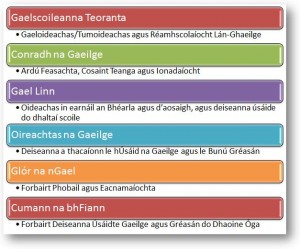Six Year Rationalisation Process Concludes
January 21, 2014
A rationalisation process initiated in 2008 came to a conclusion last week with the announcement by Foras na Gaeilge of the six lead-organisations chosen for future funding. With 19 existing bodies being whittled down to just six, a process which was instigated to ‘improve effectiveness and efficiencies’ across the sector has caused great destruction.
19 organisations who had worked collaboratively alongside one another for years, were forced into a situation of fierce competition, categorised into groups by Foras na Gaeilge, and forced to compete head-to-head.
Two radio stations, Raidió na Life and Raidió Fáilte, were granted clemency as their licencing structures prevented them from working on a 32 county basis, a prerequisite for survival under the new structure. An tÁisaonad, an organisation which provides Irish language teaching aids in Northern Ireland were also given leniency, with future funding for this organisation and the two aforementioned radio stations to be made available in future on a schemes basis.
With 3 of the 19 organisations sure of their future, the process then saw 16 other organisations jockeying for position for six golden tickets to ensure their future. Critics at the time claimed the new model could potentially destroy much of the existing language support structures across the 32 counties. The six successful applicants would be invited to take part in a new slim-lined funding structure, and all funding from Foras na Gaeilge to the remaining applicants would be discontinued from 30 June 2014.
While some of the organisations above already have a 32 county mandate, each of their headquarters are based in the Republic of Ireland which has caused concern over the perceived lack of support to be given to the existing language structures within Northern Ireland. Pobal, Altram, Iontaobhas Ultach, and Forbairt Feirste will lose their funding from mid-2014, which will result in unemployment for their current staff and possible dissolution of the organisations.
As voluntary organisations, many of these groups in theory could continue to exist, however without funding, paid staff or premises, their work will be greatly inhibited.
Speaking in media interviews this week, Foras na Gaeilge spokespersons alluded to a case of lead organisations providing employment for the staff of the unsuccessful organisations, however this has been dispelled as ‘spin-doctoring’ by some participants in the process. In just one of the remits, “Awareness Raising, Language Protection and Representation” three organisations will have their funding discontinued from the end of June which will leave fourteen staff members unemployed: Comhdháil Náisiúnta na Gaeilge (six staff members) ; Pobal (four staff members); and Iontaobhas Ultach (four staff members). While the chosen lead-organisations may be granted permission to employ one or two more staff to ensure their representation in Northern Ireland, it is unlikely that employment would be available to the remaining 12 employees.
In a statement on Friday, Kevin De Barra, Director of Comhdháil Náisiúnta na Gaeilge, the central steering council for the Irish language voluntary movement, said: “Since 2008 we have publicly flagged the difficulties with the proposed system, however in September 2013 when we chose to partake in the process, we understood that losing our funding was a potential outcome. While Comhdháil Náisiúnta na Gaeilge will continue as a voluntary organisation, albeit without funding or staff, from now until June 2014 we will be looking at ways of ensuring the projects undertaken to date will continue under the new structure”.
Gaelport.com





